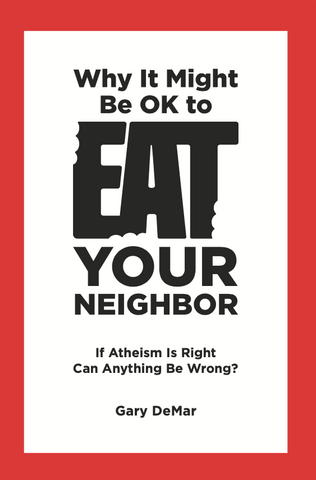This is part one of an interview by Brett Prieto about Gary’s book, Why It Might Be OK to Eat Your Neighbor.
Archimedes (287?-212 BC) once boasted that given the proper lever and a place to stand, he could “move the earth.” His problem was that he and his fulcrum needed something to stand on for the lever to do its work. Archimedes couldn’t stand on the Earth to move the Earth. He needed a place to stand (a pou sto) outside the Earth, a solid and anchored place independent of the Earth he wanted to move. His lever also needed a fulcrum. This, too, had to rest on something other than the Earth.
What is Atlas standing on while he’s holding up the Earth (the sky or heavens)? And what is what he’s standing on standing on, etc. The pagan world never could resolve the philosophical problem of the ultimate foundation for truth. This is why Pilate could seriously ask Jesus,“What is truth?”(John 18:38), given his culture’s operating assumptions about ultimate reality. No one knew. The Greeks knew they needed an ultimate standard, a personal ultimate standard, to make reality work. To cover their bases, they set up an altar “TO AN UNKNOWN GOD” (Acts 17:23).
Today’s no different. Materialists and skeptics tell us that (1) they know truthful things and (2) they can’t verify that anything they claim is true is true in an ultimate sense. Their initial claim of truth is based on some other claim of truth which is based on another claim. What they can’t come up with is an ultimate authoritative claim. What they have is a series of leaky buckets. I want to know what’s the last bucket that holds all the dripping water from the previous leaking buckets. This was the point that Greg Bahnsen made in his debate on apologetic methodology with R.C. Sproul at Reformed Theological Seminary in Jackson, Mississippi, in 1977 when I was a student there. “And as Antony Flew says, what good is it going to do [for] you to take one leaky bucket and add it to another leaky bucket? You’re just going to have a twofold leaky bucket now.” As Flew put it, “If one leaky bucket will not hold water there is no reason to think that ten can.”

Why It Might Be OK to Eat Your Neighbor
The most damning assessment of a matter-only cosmos devoid of a Creator is that we got to this place in our evolutionary history by acts of violence whereby the strong conquered the weak with no one to support or condemn them. Why It Might Be OK to Eat Your Neighbor repeatedly raises the issue of accounting for the conscience, good and evil, and loving our neighbor. It’s shocking to read what atheists say about a cosmos devoid of meaning and morality.
Buy NowThis is part one of an interview by Brett Prieto about Gary’s book, Why It Might Be OK to Eat Your Neighbor. Gary points out the impossibility of a materialist worldview to define things like love or morality. Most atheists don’t even realize the problem that they are “borrowing” morality from the Christian worldview in order to prop up their own lack of one.

